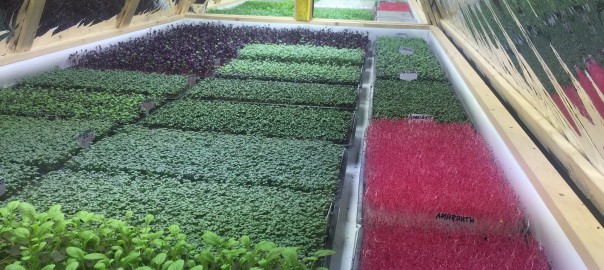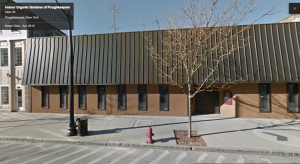
The 300th block of Main St., Poughkeepsie is the last place one would expect to find an organic garden. However, located in an office building (formerly the Kresige building), that’s just what you’ll find behind an unassuming door (I actually walked into two storage closets and Mr. Crum’s office before I found the door to the gardens). Since last August, the owner of the building, Brud Hodgkins, and resident farmer, Earl Crum, have been knocking down office walls and building 17 planting tables, a germination room, and a seeding room. The construction process is very much still underway: walls were coming down as I was touring the facility. “There are over a million square feet of unused office space in the City of Poughkeepsie,” my tour guide, Rocky, explained. The Indoor Organic Gardens seek to solve three issues:
1. Reuse of office space in the City of Poughkeepsie
2. Employment of Poughkeepsie youth, veterans, and previously-incarcerated individuals
3. Provision of nutritious food to Poughkeepsie public schools and nursing homes
Today, they focus on growing micro greens, which are the beginnings of cabbages. Mr.
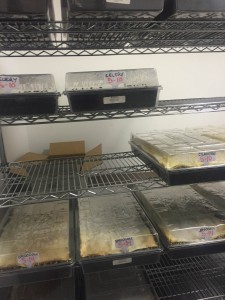
Hodgkins emphasized the importance of micro greens both in terms of sustainability and making nutritious food available.” Their efficient, nearly waterless process (only two cups of water for each crop) can produce hundreds of pounds of food per week. Rocky showed me how seeds are packed into manure in the seeding room and covered in a sort of paper towel rather than watered directly. The micro greens retain much of the nutrients that are normally lost by water-heavy processes used in commercial farming and other urban gardens. Then, a small amount of water is added and they are placed in a plastic container in the germination room, which is kept at 85 degrees. There, micro greens germinate in just 3 days. They are then placed on a table with LED lights, growing in a beautiful array.
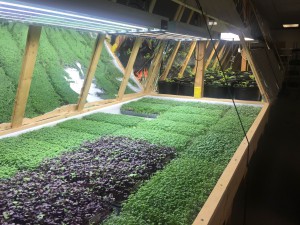
“We’re not growing vegetables, we’re growing nutritional units,” the insurance agent-turned-gardener explained, “We’re a nutritional unit factory.” Indeed, micro greens provide more nutrition and vitamins than mature cabbage leaves—their brochure says that “10 oz. of Red Cabbage at the micro green stage contains the same nutrition as 40 oz. of mature cabbage—and they a produced at an unusually fast rate. The Gardens are a for-profit entity, selling to Adam’s, Mother Earth, and other similar vendors in Dutchess County. Hodgkins explained that these profits enable them to then donate micro greens to the local schools and nursing homes to fulfill their mission of improving access to nutritious food to Poughkeepsie residents.
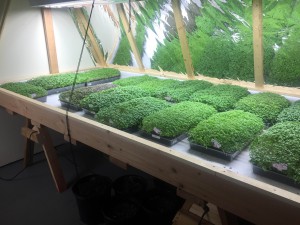
Most interesting to me was Hodgkins’ focus on hiring employees with criminal records, who had dropped out of high school, or had other limitations that employers would usually discriminate against. After experiencing a family member’s difficulties to reenter the job market after battling a drug addiction, he has made giving others a second chance a priority. Employees are trained by master farmer Earl Crum, who also owns a farm in Millbrook, and are equipped with the critical skills that Hodkins believes are the future of food in urban areas. With social and environmental sustainability at its core, the Indoor Organic Gardens are poised to expand into three more abandoned office locations in Middle Main this year. If you’d like to taste some of the Organic Gardens’ greens, try Twisted Soul’s Naughty Noodles!
Sophia Burns ’18
